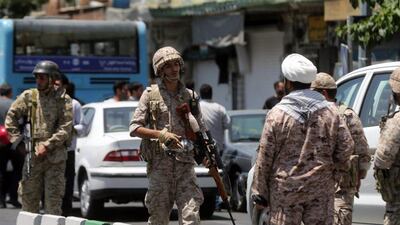US president Donald Trump is likely to designate Iran's Islamic Revolutionary Guard Corps as a terrorist organisation this week as he lays out what aides call his "overall Iran strategy".
As president Trump prepares to announce that he is decertifying the Iran nuclear deal for the first time in two years — thus leaving its fate to congress — one US official said it was "likely but not final" that the administration will designate the IRGC as a terrorist organisation.
Such designation would fulfil a requirement by congress under the “Countering America’s Adversaries Through Sanctions Act”, which was signed into law by Mr Trump on August 2. But there is also a risk it would provoke retaliation that would endanger America's military presence in the region.
According to the new law, Mr Trump has 90 days (until October 31) to either designate the IRGC under the treasury department's 13224 terrorist category, or waive that designation for national security reasons. The administration could also choose to go further and designate the IRGC as a Foreign Terrorist Organization (FTO) under state department authority, putting it in the same category as Hizbollah and Al Qaeda and warranting more sanctions internationally for any entity that deals with the group. Sources close to the administration told The National that a 13224 listing, and not an FTO designation, is the path the White House is more likely to take.
_______________
Read more:
Rouhani hits back after Trump says fate of Iran nuclear deal 'decided'
Trump weighing more aggressive Iran strategy in Gulf
Iran 'foremost state sponsor of terrorism in 2016': US state department
_______________
But even designation under 13224 would be a milestone — the first time the US has labelled the military branch of another country as terrorists.
Amir Toumaj of the Foundation for Defence of Democracies told The National, "While president Trump could waive it, it would be a politically difficult move because he would have to justify [to congress] that not designating the IRGC is in the vital interest of US national security."
A 13224 designation would freeze any assets the IRGC has in the United States and bars any US transaction with or through the group. The US designated the Quds force in 2007 under the same category, but going after the IRGC is more wide-reaching and "a signal for a more muscular approach toward the Islamic Republic”, Mr Toumaj said.
Right on cue, Iranian officials this week vowed to deliver a “crushing response” with “all options on the table” if the IRGC is designated a terrorist organisation.
The military risks leave many in the US defence establishment feeling nervous and hoping that the White House will reconsider. James Durso, a former navy officer for 20 years and the managing director of consultancy firm Corsair, told The National that designating the IRGC a terrorist body would be a "mistake" that would backfire badly on America.
"It would play right into IRGC's hands … and put our troops and advisers in Syria and Iraq in the line of retaliation," Mr Durso said. “Eventually one of them will get grabbed” — a reference to the 1979 hostage crisis and the IRGC's eagerness to pick a fight with the US.
Mr Durso said it could mean that any captured US military personnel would lose any protections under the Geneva Conventions or be deprived of the intermediation of the International Committee of the Red Cross. With that in mind, he recommended going after the money and tightening screws on IRGC’s financial network, instead of “a designation that you cannot walk back.”
Another drawback lies in cutting off any battlefield co-ordination or deconfliction channels with the IRGC or their proxies currently involved in the ground battle against ISIL.
“Certainly we have to watch out for that, given the history of militias attacking US forces in Iraq,” said Mr Toumaj. However, he added, "Any IRGC response is likely to fall short of direct attack that would elicit a response but they could be expected to try to undermine US interests or attack through asymmetric means such as proxies.”
Both Mr Durso and Mr Tournaj agree that the military presence in Iraq and Syria — which will continue for the foreseeable future — are likely to be the primary target for any response from Iran. That will be at the core of debate within the Trump administration before a decision is announced this week.


